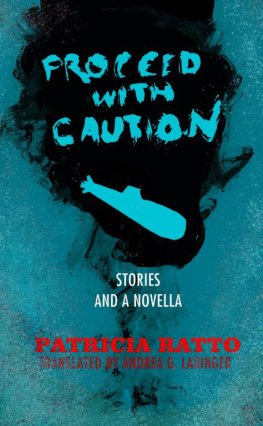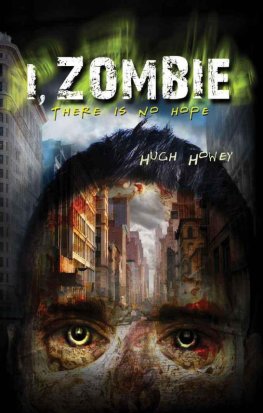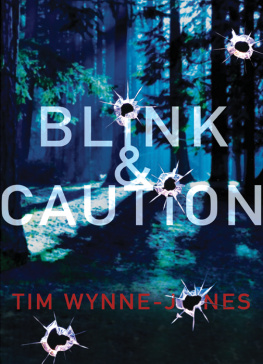Patricia Ratto
PROCEED WITH CAUTION
STORIES AND A NOVELLA

THAT DAY WE SAW an ambulance arrive, followed by two new cars. Right away we guessed they were from Santiago. They followed the road that ran alongside the cove and led to the whale processing plant. From the other end of that mouth open to the Pacific, where our houses are, we saw them open the doors and get out of the vehicles. The first thing they did was to lift their hands and cover up their noses and mouths. Its the inevitable, automatic gesture that all new arrivals make. You did it, too; no one escapes that reaction. There were several men and a few women, almost all of themexcept for one who wore a dark suitin white smocks and carrying briefcases and boxes they pulled along in a little wagon.
They moved along the concrete esplanade, till one of the women in the party stopped short, arched her body forward, and vomited forcefully. The women standing beside her moved away in a reflex action, perhaps out of disgust, perhaps to protect their clothing from stains. Everyone stopped walking, never taking their hands from their faces. One of the men in white came closer and steadied her, placing a hand on the womans bent back, and with the other offering her a handkerchief that he had taken from the pocket of his smock so that she could clean herself. We couldnt see that mans expression because we were so far away, but we imagined he must have wrinkled his nose when he moved his hand to grab the handkerchief and the smell penetrated all the openings in his face. The woman stood there motionless for a few moments, wiped her face with the handkerchief, which she then balled up and stuck into one of the pockets of her smock. Then she stood up straight and nodded, no doubt to confirm that she was ready to move on. After that we saw them go up the road and along the ramp that leads to the building.
But before I continue, I need to tell you that that stench, which invades everything, isnt the odor of Quintay itself; it arrived much later, with the people from the processing plant. Because Quintay used to be us fishermen with our nets and boats and brightly colored wooden houses at the edge of the cove. And also the whales tails sticking up high in the distance, which the kids greeted with delight and regarded with admiration, up on the black coastal rocks. Not those who came to work in the processing plant, because none of the townspeople accepted it or wanted any part of it: not the smooth, huge, square buildings or the horrible concrete ramp. Thats not Quintay.
Ever since they came, the smell is everywhere, solid, as if the air was congealed grease that you have to dive into and paddle through and climb aboard the boat and go way out to sea, fishing, far from the whaling ships, in search of someplace where you can breathe at last. But, of course, at the end of the day youve got to bring food home for the family, plunge once more into that dense, stinking smell in order to get back home. And, later, seated around the table, burn incense in the heaters so the food wont make you sick to your stomach, because if you dont, theres no way to put anything in your mouth without heaving.
Its just that the smell fouls up everything, and those people are no exception. To tell the truth, they have a worse time of it than we do, because even if they bathe and scrub and perfume themselves, and wash their clothes and hang them out in the sun to dry, when those folks from the processing plant go into town to buy provisions for the month, theres no way the locals from Valparaso can help screwing up their faces and moving aside, or even whispering softly among themselves, though not softly enough to keep the others from hearing: There go those stinkpots from Quintay.
A thousand arrived, all of them men, and they have their soccer and movies and electric lights, which we dont have, no, none of it. Thats why they dont mind the smell too much. And besides, they earn a lot of dough and can invite their friends out for drinks and dinners, and even give gifts to the young ladies from the city, who all at once stop wrinkling their noses and smile. Although deep down, or maybe not so deep down, they know that they go out and drink themselves into a stupor in order to forget the moment when the blood splatters up toward them, covering them completely, a thick blood that runs down their faces, their hands, their clothing, as they hear the piecing cry of the calf who circles nearby, calling for its mother. They drink and laugh at the Social Club and listen to Antonio Prieto sing, and they rest their heads on the girls shoulders, Clock, dont tick away the hours, between many rounds of pisco, so that dawn will never come, till they fall off their feet, in an attempt to quell the identical, carbon-copy nightmares they all haveyou know?repeated again and again, till they cant stand it anymore, each and every night.
On their backs they receive the dry blow of harpoon piercing spine; they feel the sharp spurs expand as they plunge into flesh, penetrating deeply; and they feel the container of sulfuric acid open up, allowing the acid to spill out and spread through the entrails, till it makes the grenade on the tip of the damn device explode. And they awaken screaming, soaked in sweat, gasping as if all the air had suddenly escaped from their lungs.
In the daytime, its always the same for them: they tie the tail of each whale to the boats and drag them out to the buoys. And, as theres no keeping up with the number of captured whales, they fill them with air, inflating and inflating with the compressor so that theyll float, awaiting their turn to be processed the next day, or the day after that. Then the cove fills with floating bodies, illuminated by the moon and rocked by the waves: radiant, luminous death on the surface of the water. Our little ones cant control their curiosity and, when were not watching they secretly spy, barely pushing aside the thick curtains our wives have hung on the windows to avoid seeing that view all the time.
Later, at dawn, the poor creatures are tied to a steel cable connected to a winch and dragged up the enormous ramp next to the dock, to the butchering platform. Once there, when the pickaxes are sunk into them to begin the processing, a stream of fetid water spurts out, inundating everything. And, even though no one will admit it, believe me, its as if hell has opened up and you can never be safe again.
They walk, and sometimes they run, those people, the ones from the processing plant, in their cleated shoes, over the tamed, slippery flesh. At certain times it seems like a game that even makes some of them laugh, a bitter laughter that allows you to see the dark holes where their teeth are missing. Because thats whats started happening to them: their teeth have begun to fall out. With no explanation, no cause, you might say.
First it was one man, then another, and another, and yet another. And then there were many, and finally all of them, no matter what their age, physical condition, or job at the plant: from the workers to the bosses. So they brought a doctor from Valparaso who examined them and prescribed some vitamins, or at least thats what they told us. They all took them religiously, waiting for the misfortune to end. But time went by and everything stayed the same: their teeth kept falling out, resistant to all treatment.
Then that group from Santiago came, arriving with doctors and nurses and syringes, to take samples of everyones blood. And there was the business of that woman, of course, the one who vomited; Ive already told you about that. What I didnt tell you is that the poor thing felt sick all day long, according to what some of them told us later. And suddenly she started shouting things that no onearound therewanted to hear. There was no way to make her stop, till they got off the ship and went to the cove and climbed into their cars and went away forever.












